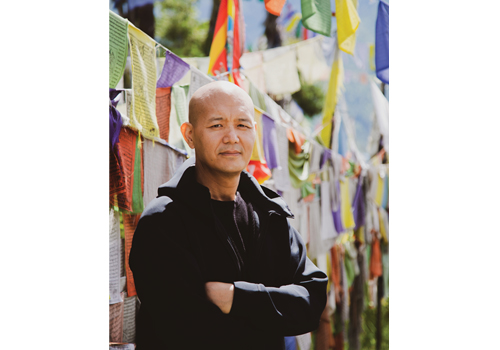By Developer
Copyright thebhutanese

By Tshering Dorji (Mr Bhutan)
Whenever I travel abroad and tell people I’m from Bhutan, they often respond with, “The happiest country in the world.” I usually smile and reply, “Allegedly,” with a touch of humor. Today, I invite you to join me on a journey to uncover why Bhutan is both correctly and incorrectly celebrated as the happiest country.
Around 500 BC, the earliest explorers of happiness were guided by notable figures such as the founder of Buddhism, Gautama Buddha, the renowned Greek philosopher, Socrates, and the esteemed mystical author of the Yoga Sutras considered the Bible of yoga, Patanjali. These studies were largely focused on spiritual and religious practices, with little influence on the general population.
Starting around the 1990s, the scientific community in the United States began researching and studying happiness under a new branch of psychology called “positive psychology.” Names like Mihaly Csikszentmihalyi and Martin Seligman stand out. It was a breakthrough. In a world where science has become the new religion, happiness found a very safe and reliable place. However, it still fell short of reaching the worldwide audience it needed to influence the ordinary man and woman.
Bhutan’s reputation for happiness is not an accident. It comes from the extraordinary vision of our Great Fourth King, His Majesty Jigme Singye Wangchuck.
The Great Fourth introduced the profound vision of Gross National Happiness (GNH), a noble and novel paradigm that redefined how a nation’s progress should be measured beyond GDP. GNH places the well-being of the people at its core, encompassing good governance, harmony with nature, preservation of culture, and sustainable development.
This farsighted vision of the Great Fourth brought Bhutan global recognition. In 2012, Bhutan’s idea of GNH inspired the first-ever United Nations forum on happiness. With international media and scholarly attention, Bhutan’s name became synonymous with happiness. Soon after, the Sustainable Development Solutions Network, in partnership with Oxford University and the Gallup World Poll, began measuring the collective happiness of nations, a global initiative rooted in the legacy of the Great Fourth.
The highest rank Bhutan has ever achieved in the World Happiness Report is 84th, which it reached in 2017. Why? The current measurement heavily relies on three key factors: 1. GDP, where Bhutan’s economy is small compared to the rest of the world. 2. Life expectancy, which is about 10 years lower than wealthier nations due to a relatively limited healthcare infrastructure. 3. Generosity, while the report measures generosity through monthly donations, Bhutanese generosity takes the form of time, compassion, service, which don’t always translate into measurable data. Despite this low ranking, Bhutan continues to capture the imagination of many as a beacon of happiness.
Current scientific research on happiness shows that the most positive and robust contributors to our happiness are: 1. Social connections, 2. Physical health and exercise, 3. Money (only up till a point), 4. Purpose and meaning in life, and 5. A sense of freedom
Let’s explore these findings more closely to understand the depth and scope of their influence on us. Most guests who visit Bhutan come from developed countries. These countries have embraced technology, efficiency, profit, personal independence, and luxury to the extent that they have significantly reduced human contact.
Self-check-in counters, online shopping, virtual businesses, work-from-home setups, and a separation of work and personal life have created a world of isolation. In this world, material possessions replace human connection. Meanwhile, Bhutan remains an antithesis to Europe and North America, as it values everything science is convincingly pointing towards. So when the world comes to Bhutan, this is what most guests encounter:
1. Human Connection: Almost every task in Bhutan necessitates interacting with someone for a considerable amount of time. You are seen and heard. You encounter a world where the concept of family extends far beyond that of a typical western household. Husbands, wives, children, grandparents, uncles, aunts, cousins, friends, and neighbors are all closely and frequently woven into a family, within which sharing and caring unfold lovingly and seamlessly.
Research has shown loneliness to be twice as harmful to health as obesity. Human connection is a very powerful antidote to stress and life’s many obstacles. It helps heal and rejuvenate you, creating room for happiness to arise.
2. The Power of Faith: Even a blind tourist in Bhutan would endlessly encounter Buddhism. It is deeply woven into every fabric of Bhutanese life, from dawn to dusk and from birth to death. Every home has a prayer room or an altar, and every inch of Bhutan is dotted with stupas and monasteries. Almost every Bhutanese is immersed daily in some prayers, rituals, practices and seasonal and religious festivals, they find meaning, purpose, community, and hope in their lives through faith.
Scientific research report higher levels of happiness and life satisfaction in people who practice or associate themselves with some religion and spirituality. As it connects people through communion, it offers a meaning and purpose, making them more resilient in times of stress as they use their faith as a coping method and their community as a soothing balm.
3. The Last Shangri-La: One of the easiest ways to change a habit, belief, or value is to place oneself in a new environment. If you want to become happier consider moving to a happier country. In just a few hours, a westerner is transported to Bhutan, the last Vajrayana Buddhist Kingdom, where the modern world coexists in harmony with ancient traditions. Here, the line between work and life blurs, and visitors are confronted with a new reality, one where simplicity, community, and connection are valued over individualism and materialism.
Studies show that our immediate environment, people, nature, weather, and the built environment, profoundly influence our happiness.
4. Money: Current research shows that money contributes significantly to happiness only until your basic needs are met. In Bhutan, education and health care are free, and everyone has a roof over their heads, sufficient food in their bellies, and warm clothes to protect them from the elements. A little disposable income to splurge on simple pleasures means that even if Bhutan were to grow richer overnight, money’s impact on her people’s happiness, at best, would be minimal.
Why doesn’t more money contribute to more happiness?
As studies have shown, once basic needs are met, more money brings new problems. Over time, luxuries become necessities, reducing the ability to enjoy simple things. Additionally, comparing oneself to wealthier individuals fosters a sense of insufficiency.
5. Physical Health and Exercise: Modern societies rely on elevators, escalators, and fast food. In Bhutan, life encourages gentle movement and healthier eating. People climb hills, circumambulate temples, and cook traditional meals from scratch. There are no global fast-food chains, and religious practices such as prostrations and pilgrimages double as exercise. Research confirms that regular activity is one of the most effective ways to boost happiness and improve mental health.
6. Sense of Freedom: Bhutan is a country that has never been colonized, and it exudes an essence of purity and sanctity. It is a Democratic Constitutional Monarchy, where the King is the Head of State and a symbol of unity, and a democratically elected government. Relatively speaking, Bhutan has had a very peaceful and stable existence, so citizens have always had the freedom and possibility to shape their lives the way they desire.
Scientific research consistently finds a strong correlation between freedom and happiness. Autonomy, or the ability to make choices and control one’s life, is one of the most significant predictors of well-being.
Bhutan may not officially claim the top spot on the World Happiness Report, but its true essence cannot be captured by numbers alone. It is in the heart of this land, where countless visitors find themselves transformed, rediscovering joy and meaning through the kindness of its people and the simplicity of life. In Bhutan, happiness isn’t just measured, it’s felt, deeply and profoundly, in every connection, every shared smile, and every moment of peace.
As the world continues to chase material success, grappling with loneliness, mental illness, and a yearning for meaning, Bhutan stands as a humble yet powerful example of the profound benefits of valuing health, family, community, nature, and spirituality. In a time when true happiness feels increasingly elusive, Bhutan reminds us that the answers lie not in wealth, but in the simple connections we nurture with ourselves, each other, and the world around us.
Mr Bhutan (Tshering Dorji) is a health & happiness guide, writer, speaker, and pioneer of Bhutan’s bodybuilding and fitness movement. His mission is to make health and happiness simple, practical, and possible for everyone.



